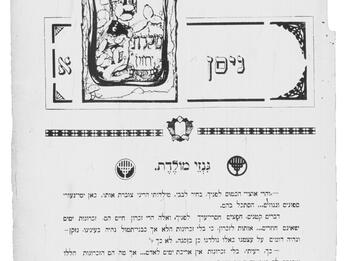The Ignoramus: A Cultural Sketch
Aron Wolf
Aron Wolf often terrified us children, and yet he was one of the most harmless people one can imagine. He never hurt anyone, nor did he ever approach any of us with as much as a word.
But his mere appearance was something outlandish. His exceedingly tall body was bent forward. He carried his head retracted between his shoulders, and his neck seemed to have lost the ability to move and turn his head. Aron Wolf always looked down right in front of him. His lean, strong-boned body was steered forward by feet that hardly left the ground.
His lips often moved in soft soliloquy that became loud when he believed himself unobserved. I never saw him talk to another person, and never saw his eyes smile.
His clothes were the same in summer and winter. An overcoat of undefined color that in its youth and heyday may have belonged to a person of much smaller stature, exposed his legs in almost their entire remarkable length. The cap with its large leather visor was pushed far back on the head.
The absence of a beard exposed his thin face with its strong cheekbones and unusually large mouth. [ . . . ]
I accepted the man’s strange behavior in the manner of children and did not think too long about how he had acquired it. Only much later did I look into its origin and gradually learned the following story.
Medinegayer’s1 Return Home
In his younger years, Aron Wolf was no different from other people in the community. In his big, strong body lived a plain and simple soul, content with the monotonous and unprofitable profession of a medinegayer. [ . . . ]
Then an important event occurred in the community. [ . . . ]
It acquired a teacher of religion with a modern education. He was soon seen going about his work.
Shabbat Afternoon—The Work Begins
On a Shabbat afternoon Aron Wolf “examined” again his son Moritz who began as always:
But what were these words that now issued from the boy’s mouth?
What did these German words that Aron Wolf could easily understand have to do with those incomprehensible ones that had been familiar to him since his earliest childhood? [ . . . ]
The boy had long since closed his prayer book and run out to join his playmates. Yet Aron Wolf still sat there and stared at the little book from which the marvelous words had come.
All of them were supposedly written in the little book that had been his steady companion on his long and barren walk through life. With this little book he had risen and gone to sleep. It had been his companion at home and on his travels, and in it he knew every page and every word.
All of that is in this little book?
The words had always instilled in him awe as in the presence of holiness! As in the presence of something great and powerful!—But unapproachably sublime and distant!
But what he had heard today were such different sounds! Words that anyone could understand!—And yet not everyday sounds!—Those were words of love and of faith!
What he had heard today was how he had often felt when he was talking to his son. And he had felt then that the words he was using in such moments were awkward and clumsy and could not express his delicate feelings.
Now he was hearing words that expressed what he had felt and thought in such moments. [ . . . ]
[Later, Aron Wolf talks to a Christian peasant.] [ . . . ]
When Wolf wanted to put the prayer book aside, after touching it with his lips, the peasant asked permission to look at it. [ . . . ]
The peasant shook his head to express that he understood nothing of the content. But when he half audibly said to himself: “Who could possibly understand this!”2 Aron Wolf thought that this was the right moment to tell the peasant about his experience and he introduced his tale with the words: “My son understands that.” Then he talked about the teacher who knew German and Yiddish well, and about his son who had taken in all of his teacher’s wisdom and brought it home.
So that the peasant would not think that Wolf had told the story only to praise his Moritz and his religion to him, Wolf opened the siddur and pointed to the place where the Shema‘ was printed in big letters and recited it in excellent High German the way he had heard it from Moritz:
“Hear, Israel, the Eternal, our God, is One God.” [ . . . ]
Certain of his victory, Wolf looked at the peasant. He had just demonstrated that his own religion was not as backward or inferior as the man had always believed. [ . . . ]
But the peasant went to another room and returned with a large leather-bound Bible, leafed through it for a moment and then read out loud:
“Hear, Israel, the Lord our God, is one Lord.”
Wolf did not know the German letters and listened with increasing amazement. As long as the peasant read only the words that he had recited earlier, he had remained suspicious, but when he heard more of the words than he had heard from Moritz, all doubt disappeared.
Yes, it was certain, the words were written in the Christian Bible.
Now it was the peasant’s turn to feel victorious, and when he closed the Bible, he said:
“It’s all right, Wolf, you are only a Jew; but your son is already half a Christian.”
The poor peddler stood thunderstruck and continued to stare at the same point through the window where the sun was just sinking under the western horizon.[ . . . ]
So that was the goal of the reformers and Enlighteners, to lead the young very gradually, so that no one realized it, toward Christianity. And he had been so delighted, had regarded his son as special and chosen, and it was a peasant who had to open his eyes! [ . . . ]
Gitel claimed that her husband had been struck by a bad cold. She believed that his state of intense agitation over the past few days had already been a symptom of the illness.
But Moses Abramczik suspected the true cause. He spent time at the sickbed and took care that the sick man did not lack nursing and medical attention. To the family he offered consolation, advice, and help to see them through the hard time.
When Aron Wolf recovered, he had become the man whom I had known in my childhood and whom I described at the beginning of this story.
He has long been put to rest.
Notes
Peddler.
[The peasant speaks in a northeastern German dialect, which Aron Wolf replies to, but it is notably different from the way he talks to his son.—Trans.]
Credits
Published in: The Posen Library of Jewish Culture and Civilization, vol. 7.




